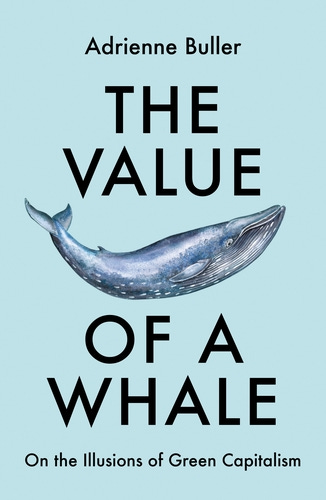The Value of a Whale: On the Illusions of Green Capitalism
Adrienne Buller
Manchester University Press 2022
350 pages
Ambitious goals were envisioned on the first Earth Day. In the name of conservation and the environment orators urged a return to line drying laundry and giving up our cars. Maine Senator and future presidential contender Edmund Muskie gave a speech to a crowd of 25,000 in Philadelphia, saying, “A cleaner environment will cost heavily in foregone luxuries, in restricted choices, in certain goods and services, and hard decisions about our national priorities.”[1]
Those were some pretty tough words from a politician, unimaginable in today’s world. Yet Muskie and others on that first Earth Day recognized that saving our environment required us to drastically change much of the way we lived, most of which ran counter to the consumerist culture of the United States. That year, 1970, CO2 concentrations hovered around 325 ppm (They now stand at over 400 ppm today.); the Amazon rainforest had yet to burn at the rate of thousands of acres per year; and the term “sixth mass extinction” had not become part of our ecological parlance. Had we heeded Muskie’s words and the words of other speakers that day, there may not have been a need for Adrienne Buller to write The Value of a Whale.
But fifty years after the first Earth Day, our priorities have shifted. As Buller points out, neoliberalism is the mindset that rules our politics, economics, and our approach to the environment today. Traced back to the postwar thinking of economist Friedrich Hayek* and closely associated with the Reaganomics of the 1980s, neoliberalism believes that markets are sacrosanct and are to be left unhindered by governments. Finance is to be deregulated, and capital should flow freely across borders. NAFTA serves as a good example here. Neoliberalism has also entailed the crushing of organized labor. Governments are nonetheless called upon to support and protect markets, as when banks were bailed out during the 2008 financial crisis. In the U.S. neoliberalism has found a home in both major political parties.
Leyla McCalla lets you know that Money is King. Hear the original at this link.
If we think of the world as a big market, then everything has a price tag on it, not only the oil and minerals that we mine from the Earth or the crops harvested from our farms, but the water in aquifers, forests, and even the wild whales that swim the depths of the seas, hence the title of Buller’s book.
The target of Buller’s critique is green capitalism—or what I’ve more often heard of as eco-capitalism—the neoliberal belief that markets, as opposed to laws and regulations, can best solve environmental and ecological problems. Given that the world’s CO2 output has increased over the decades, rainforests continue to be plundered, and ecosystems around the world are on the brink, no one could justifiably claim that the use of markets has proven effective in protecting the planet. Yet I don’t believe that anyone has sufficiently explained, and explained as well as Buller, why this approach is a failure. From carbon credits to electric cars she demonstrates how these strategies fall short or simply amount to greenwashing.
Economists, businesses, and politicians repeat the “let the market decide” mantra when they promote carbon taxes as a means of reducing greenhouse gas emissions. Yet Buller cites the work of Jessica Green, Assistant Professor of Environmental Studies and New York University, who points out that little research has been done on the effectiveness of carbon taxes. The little that has been done indicates that carbon taxes might lower emissions, but only by as much as two percent. Buller highlights the potential unfairness of such schemes. Sure, the tax will be placed upon individuals who continent hop in their private jets, but it will also affect home heating for those barely able to afford it.
Switching to electric cars is still extractive. Metals still need to be mined from the Earth, and plastics still need to be manufactured for them. The lithium for their batteries can cause environmental and societal harms. Buller cites Chili as an example of a country that is now suffering because of the heavy mining of lithium.
I was utterly surprised to learn, thanks to Buller, that the target of two degrees Celsius of warming that is bandied about in policy circles, even scientific circles, as an “acceptable” amount of global heating was not derived from careful scientific judgment. No assessment was made as to the amount of warming the Earth’s oceans, forests, or deserts would bear. Rather, the two degree figure is derived from the work of economist William Nordhaus who, in 1975, “‘thinks out loud’ about what might constitute a reasonable limit of global temperature rise for humanity to achieve, after which the 2 degree Celsius target began to percolate through the halls of influential policy makers.” Holy Hannah! That’s where the idea that two degrees Celsius comes from?
The Value of a Whale is a challenging book. I have to admit that I read chapter three on asset management twice, and I’m still not sure I fully understood it. The Value of a Whale is also a very necessary book. Presently, COP27, the UN climate conference being held in Egypt, is being sponsored by Coca-Cola, an extractive and polluting global conglomerate. PR for the conference is being performed by Hill + Knowlton, which has run climate denying interference for fossil fuel companies. This is exactly the kind of moneyed influence on environmental decisions that Adrienne Buller laments in The Value of a Whale.
For more environmental science & news follow me on Twitter @EcoScripsit.
*Conservatives and neoliberals willingly ignore portions of Hayek’s writing that runs counter to their absolutist approach to markets. In The Road to Serfdom Hayek admits that there needs to be laws protecting forests. If he were alive today, he might also include water, air, and climate change.
[1] GLADWIN H. "Activity Ranges from Oratory to Legislation: Oratory and Legislation Mark Drive on Pollution 'Environmental Revolution' no Observance in Earth Cites Recent Oil Spills." New York Times (1923-), Apr 23, 1970, pp. 1. ProQuest, https://www.proquest.com/historical-newspapers/activity-ranges-oratory-legislation/docview/119221755/se-2.






